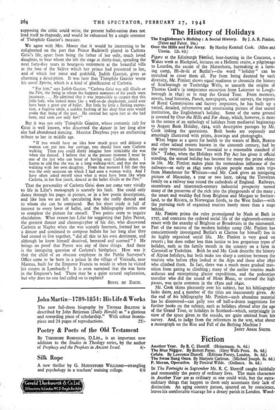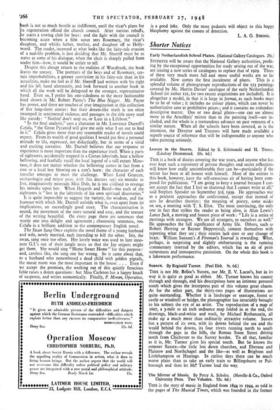Fiction
Another Year. By R. C. Sherrill. (Heinemann. 9s. 6d.) IN The Fortnight in September Mr. R. C. Sherriff caught faithfully and memorably the poetry of ordinary lives. The main characters in Another Year are as ordinary as one could wish, but the extra- ordinary things that happen to them only accentuate their lack of distinction. An aging country parson, spurred on by conscience, leaves his comfortable vicarage for a dreary parish in London. Wood-
Roank is not so much hostile as indifferent, until the vicar's plans for Its regeneration offend the church council. After various rebuffs, le starts a rowing club for boys : and the fight with the council is becoming acute when a film scout sees Rosemary, the vicar's 'daughter, and whisks father, mother, and daughter off to Holly- wood. The reader, incensed at what looks like the fairy-tale evasion of a real-life problem, is just deciding that Mr. Sherriff must be as naive as some of his dialogue, when the chair is sharply pulled from under him—how, it would be unfair to tell.
Despite this abrupt return to the realities of. Woodbank, the book leaves me uneasy. The portraits of the boys and of Rosemary, cer- tain improbabilities, a greater conviction in his fairy-tale than in his actualities, make me feel as if Mr. Sherriff had written with his right and his left hand alternately, and look forward to another book in which all the work will be delegated to the stronger, representative hand. Even so, I prefer his one-sidedness to the more fashionable kind shown in Mr. Robert Payne's The Blue Nigger. Mr. Payne has power, and there are touches of true imagination in this collection of five long-short stories: but their dream-like truth is too often swamped in sentimental violence, and passages in the title story read like parody : " Nothin' don't stop us, or Lust in a Lifeboat."
" In the, final analysis," says a character in Mr. Lawrence Durrell's Cefalu, " the Great Pyramid will give me only what I set out to find in it." Cefalu gives more than any reasonable reader of novels could expect. From its wealth of good qualities I would put first a personal attitude to life, expressed, not didactically, but in terms of a vivid and exciting narrative. Mr. Durrell believes that our response to experience is more important than the experience itself. When a party of sightseers, accidentally trapped in a Cretan labyrinth, hear a hollow bellowing, and fearfully recall the local legend of a still extant Mino- taur, it does not matter whether the bellowing comes in fact from a cow or a local boy blowing on a ram's horn : the character of each traveller emerges to meet the challenge. When Lord Graecen, archaeologist and minor poet, with (his doctors say) six months to live, imaginatively misreads Miss Dale, he is too civilised to revenge his mistake upon her. When Hogarth and Baird—but each of the sightseers is " lost in the labyrinth of his own spiritual discoveries."
It is quite impossible to suggest the variety, the wisdom, and the humour with which Mr. Durrell unfolds what is, even apart from its implications, an exceedingly good story. The characterisation is sound, the movement of the story natural and easy, and the texture of the writing beautiful. On every page there are sentences that startle one into delight and agreement ; chastening sentences, too. Cefalu is a brilliant addition to the contemporary English novel.
The Swan Sang Once exploits the novel theme of a young husband and wife, newly married, each intending to kill the other. Iris, the swan, sang once too often. Her lovely voice was used to lure inno- cent G.I.'s out of their jungle nests so that the Jap snipers might get them. She would sing " Home Sweet Home " for this purpose: and, careless like, she sang one bar wrong. So it came about that, to a. husband who remembered a dead child with golden pigtails, the music room was the most important in the house. . . . Even if we accept the premises, the working out of this quietly ferocious fable raises a dozen questions : but Miss Carleton has a happy knack of suspense, and writes economically. Finally, P. Moran, Operative,
is a good joke. Only the most pedantic will object to this happy blasphemy against the canons of detection.
L. A. G. STRONG.



































 Previous page
Previous page